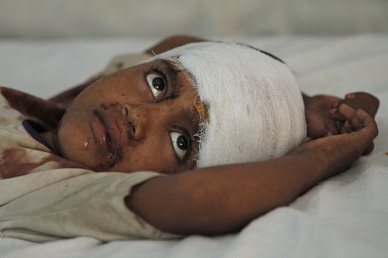The Weekly Number 09/15/2013
As the Organization for Security and Cooperation in Europe (OSCE) takes up the issue of religious harassment and persecution in its 24 Sept. meeting in Warsaw, the following incidents occurred just in the past week. They are part of an ongoing global pattern revealed by a series of Pew Research studies.
- Sectarian riots 127 km northwest of India’s capital New Delhi killed at least 31 people and forced hundreds to flee from their homes in a sign of rising tension between Hindus and Muslims. Mehrana, a 6-year-old girl injured in the sectarian clashes (pictured), gets treatment at a district hospital in Muzaffarnagar
- A Catholic priest was attacked with acid in Zanzibar, Tanzania. This follows similar attacks on two British volunteer teachers also in Zanzibar. The attacks come as Islamist extremism is reportedly rising in the area.
- English football fans who chant a word which has been deemed anti-Semitic have been warned that they face criminal prosecution if they continue.
- France posted a list of rules that remove all signs of religion from classrooms – a move some say is in response to growing Muslim visibility.
- A dozen Vietnamese followers of the Falun Gong spiritual movement were reportedly detained and severely beaten by authorities in China.
- Police arrested a man accused of desecrating a religious icon at an Ethiopian church in northwest Washington D.C. last Sunday.
- A fresh wave of sectarian conflict killed more than 40 people across Iraq last week. This and the sectarian nature of Syria’s civil war and “unprecedented” rise in attacks on Coptic Christians in Egypt are examples of the type of violence Jordan’s King Abdullah recently said threatens to “destroy” the Arab and Islamic world.
Here are 6 findings from the Pew Research Center about harassment of religious groups as the OSCE and others grapple with this issue (see point 6 for details on Europe).1. As the incidents from last week mentioned above show, harassment and intimidation by governments or social groups take many forms, including physical assaults, arrests and detentions, the desecration of holy sites and discrimination against religious groups in employment, education and housing. Harassment and intimidation also include such things as verbal assaults on members of one religious group by other groups or individuals.2. Overall, across the five years of the Pew Research study, religious groups were harassed in a total of 185 countries at one time or another. Adherents of the world’s two largest religious groups, Christians and Muslims – who together comprise more than half of the global population – were harassed in the largest number of countries, 145 and 129 respectively. Jews, who comprise less than 1% of the world’s population, experienced harassment in a total of 90 countries, while members of other world faiths were harassed in a total of 75 countries.
3. Harassment or intimidation of specific religious groups occurred in 160 countries in 2011, the same number as in the year ending in mid-2010, according to the Pew Research study. In 2011, government or social harassment of Muslims was reported in 101 countries; the previous high was 96 countries in the first year of the study. Jews were harassed in 69 countries in 2011, about the same as the year before (68 countries, which was the previous high). As noted above, harassment of Christians continued to be reported in the largest number of countries (105), although this represented a decrease from the previous year (111).
4. In 2011, some religious groups were more likely to be harassed by governments, while others were more likely to be harassed by individuals or groups in society. Jews, for instance, experienced social harassment in many more countries (63) than they faced government harassment (28), according to the Pew Research study. Similarly, followers of folk and traditional faiths faced social harassment in four times the number of countries (21) as they faced government harassment (5). By contrast, members of other world faiths, such as Sikhs and Baha’is, were harassed by some level of government in about twice as many countries (39) as they were by groups or individuals in society (18).
5. Government or societal initiatives to reduce religious restrictions or hostilities were reported in 150 of 198 countries, or 76% of all the countries and territories studied. The most common types of initiatives, in descending order of prevalence, were: interfaith dialogue; efforts to combat or redress religious discrimination; educational and training initiatives; and land- or property-related initiatives. For examples of each type, see the full Pew Research analysis.
6. In Europe, Muslims and Christians faced harassment by government officials or policies in the largest share of countries in 2011 (49% and 36% respectively), while Jews and Muslims faced harassment by individuals or groups in society in the largest share of countries (69% and 64% respectively). For instance, the European Court of Human Rights recently found that British law does not adequately protect an employee’s right to display religious symbols in the workplace – such as wearing a cross. In France, a Rabbi and several Jewish school children were gunned down in a brazen act of terror. In Russia, the Mayor of Moscow has limited the number of mosques to four despite a growing Muslim population, which numbers more than 1 million due to migration. This means – per mosque – hundreds of thousands of people would have to squeeze into spaces meant only for hundreds.
For a discussion of global social hostilities involving religion and government restrictions on religion with Europe’s place in relation to other regions, see my TEDx Talk.













